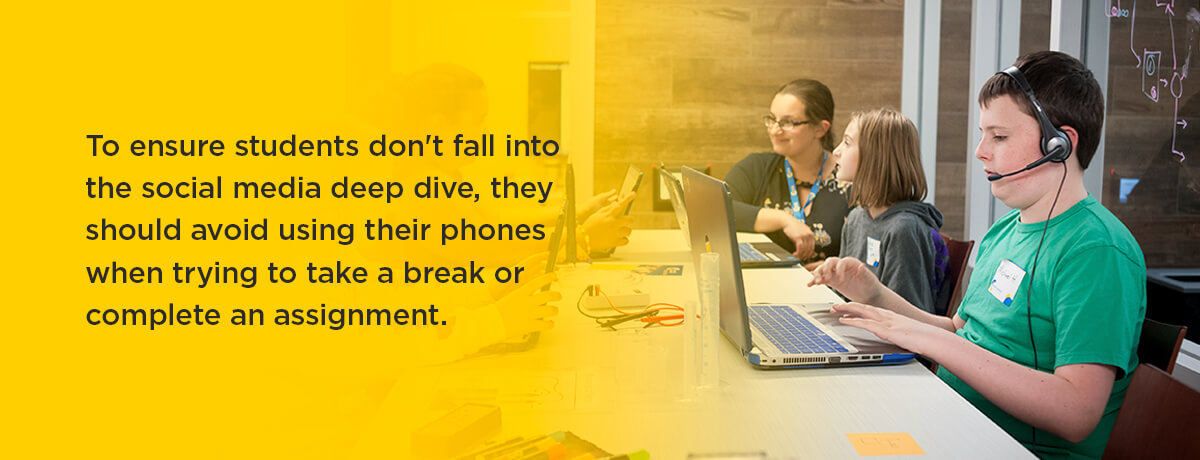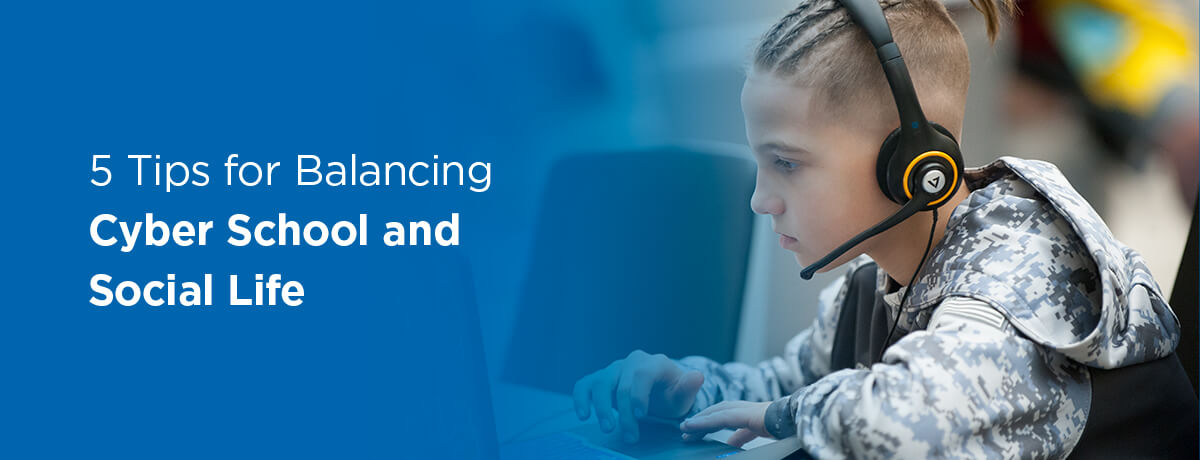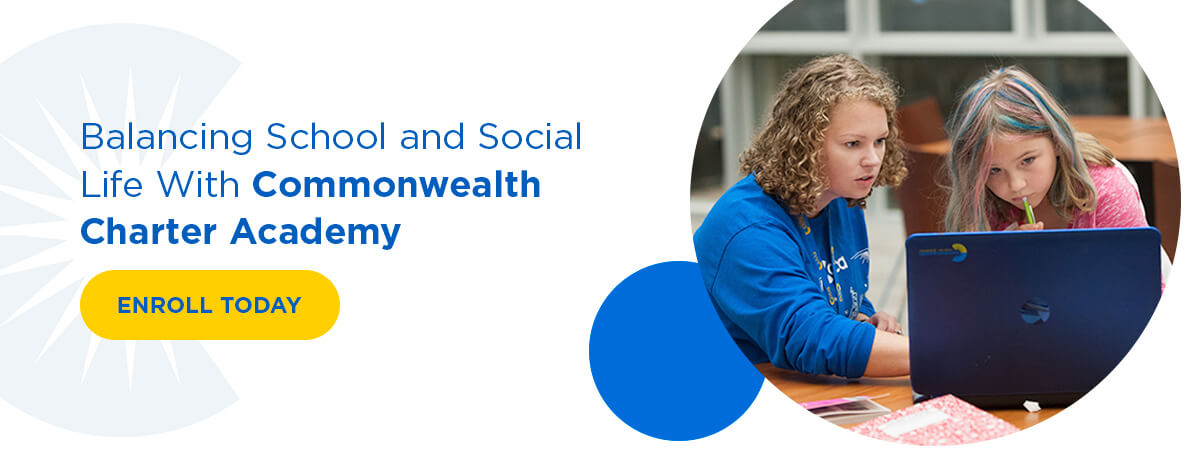Schoolwork is a large portion of students’ lives. The school day takes up most mornings and afternoons, and additional assignments can take time into the evenings. Balancing school and work can be challenging enough. Trying to find time to visit with friends simultaneously can feel overwhelming.
Creating a school and social life balance is important to physical and mental health. Effective time management can help students reach their goals while excelling in studies and spending time with loved ones. By setting boundaries, breaking down tasks into manageable pieces, and connecting with friends in various ways, students can stay on top of school work and maintain meaningful relationships in a virtual learning environment.
Ways to Connect With Friends in Cyber School
Beginning a new school year online can be a challenging transition for students. It’s common for them to feel lonely when they are used to sharing the physical learning space with others. Maintaining friendships can also be daunting as learners navigate when to reach out, meet up, and socialize with their peers while balancing their coursework and extracurricular activities. While students attending classes in person can chat with friends in the hallways or during lunch, virtual students don’t have the same opportunities.
Social connections and lasting relationships are vital to student success for those in the classroom or at home. Here are some ways students can stay connected with their friends while working from home:
- Virtual study groups: Meeting with classmates for a virtual study session is an excellent way for students to get ahead on coursework while connecting with peers.
- Online discussions: Virtual classes often leave opportunities for collaboration inside and outside of class periods via online discussions. They can reach out to discuss assignments and discover new ideas or have conversations about class materials and work.
- Call or text: Texting and calling are exceptional ways to connect with friends. With texting, students can keep up a conversation for hours when they’re free to answer. Additionally, they can call friends while getting ready for the day, unwinding for the night, or preparing lunch.
- Connect on socials: Social media is a digital world that can pull people together. Friends post pictures and status updates about their lives daily. Students can comment on their friends’ threads, private message them, or send funny photos to start a conversation and stay up to date.
- Have a group call: When students are busy but still want to spend quality time with their friends, hosting a video call is a fun way to connect. They can invite as many people as they want to watch a movie, play a game, or just chit-chat.
- Play online games: With a video game system or a computer, students can invite friends to play online. They can choose a favorite multiplayer game and challenge each other or video chat while playing a single-player game at the same time.
- Host weekend meetups: Sometimes, students get so busy during the week that it’s hard to meet up after classes. Getting together at a local shop, mall, or restaurant on the weekends is great for relaxing and having fun with their closest friends.
How to Balance School and Life
It may be hard for students at home to define when school ends and free time begins, but it is important for them to dedicate time to both work and play. They can get tired and drained as they work through tough assignments and spend time researching new topics. Spending time with friends is an excellent way to rejuvenate and make every day easier. Alternatively, students who dedicate too much of their time to friends may neglect their coursework and struggle to stay on task.
Finding a healthy school-life balance is key to staying on top of studies while maintaining lasting relationships. Thankfully, students can do plenty of little things to ensure they dedicate the time needed to tasks and friends.

Set Social Time Limits
Setting time limits can remind students when it is appropriate to reach out to a friend and when to turn their phones off. Social media can become a major distraction if they forget when to sign off, and it can be easy to watch hours go by while scrolling through Instagram or viewing videos on TikTok.
To ensure students don’t fall into the social media deep dive, they should avoid using their phones when trying to take a break or complete an assignment. If they must use their phone, they can try setting a timer to remind them to turn it off until they finish the task they’re working on.
Create a Schedule
Preparing for the days or weeks ahead can help students stay on top of work as they determine how much time they need to meet deadlines. A daily routine can keep their day moving productively and ensure they spend enough time on every task. For example, if a student has a research paper coming up, spending an hour or two every day for a few weeks before it’s due makes the task manageable and leaves them time to complete other tasks or spend time with friends and family.
Set Personal Goals
Goals can be big or small, as long as they are achievable. Students likely already have future goals for their life, education, and career path. By creating coursework goals, they can devise an actionable plan to come up with a way to reach them. Instead of reading an entire book in one night, students can read one or two chapters each night until they reach the final page.
Don’t Procrastinate
Procrastinating can lead to a range of negative outcomes. A student may forget about assignments, overload their schedule, or miss an incredible opportunity because they passed a deadline. It can be easy to justify procrastination if students claim they will catch up on work later. However, they lose valuable time and experiences the longer they procrastinate.
For example, a student may have pushed aside completing a lengthy project to play video games only to discover there is a concert they want to attend the night before the project is due. Had they spent time working on their project throughout the week, the students likely could have played some video games, gone to the concert, and still completed an excellent project in time to turn it in.
Reward With Breaks
Breaks have many benefits, including clearing the mind and improving mental health. Many people forget the importance of breaks because they’d rather complete work faster or don’t want to break their concentration. However, neglecting breaks can lead to high stress levels and burnout.
Taking a walk, making a good meal, shutting their eyes for 15 minutes, or reading a book are all great ways for students to give themselves a break. While it’s important to finish work, it’s much better for the body and mind for students to complete tasks in chunks and dedicate time to taking care of themselves between assignments. After they finish their science schoolwork, they can take a break before diving into math.
Balancing School and Social Life With Commonwealth Charter Academy
Commonwealth Charter Academy is a Pennsylvania public cyber charter school. At CCA, we understand that every student has differing needs. Some students spend their days working while others need extra time for studying and comprehension. We know the traditional one-size-fits-all method doesn’t work, which is why we create holistic learning experiences for our students to meet them where they are.
Enroll at CCA for a dynamic, unique, and safe learning environment. We break the mold at CCA, and we want to deliver each student a customized educational experience that encourages them to maintain their relationships while excelling in their classes. Contact us for more information.




